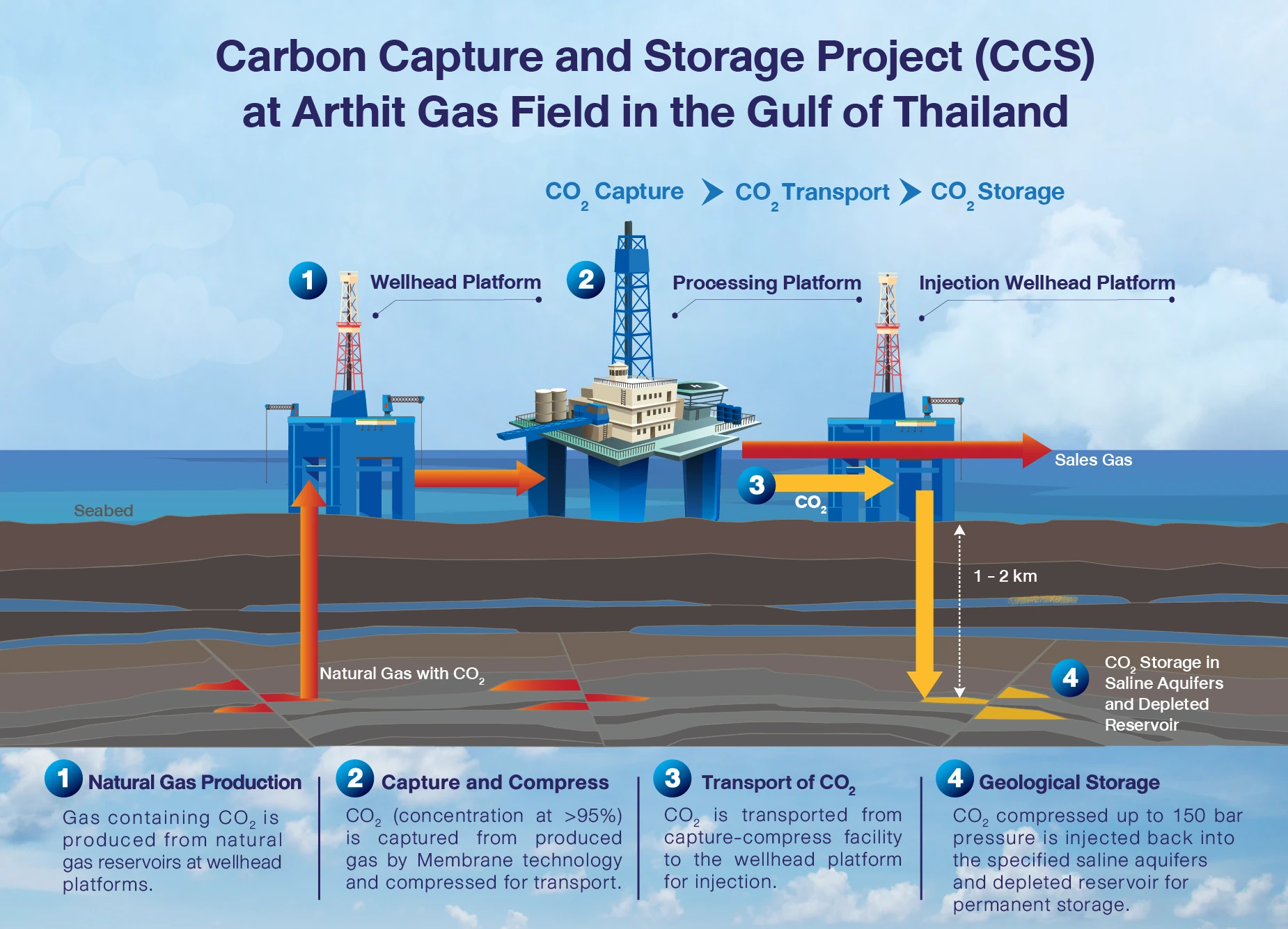
Carbon Capture and Storage
Carbon Capture and Storage (CCS) is one of PTTEP's strategic pathways amidst the energy transition movement to become a low-carbon organization with sustainable growth and to achieve Net Zero emissions within 2050, which will hence support a reduction in industrial and domestic emissions under Thailand’s commitment at the United Nations Framework Convention on Climate Change (UNFCCC)’s 26th session of the Conference of the Parties (COP26) to reach carbon neutrality by 2050 and net zero greenhouse gas emissions in 2065.
What is CCS?
CCS is the process of capturing carbon dioxide (CO2) from industrial sources before it enters the atmosphere and permanently storing it in an underground geological formation. The sequestrated carbon will be properly managed and monitored for total safety. As CCS is capable of significantly reducing emissions compared to other technologies, several countries have planned to use it as the key technology to support their decarbonization ambitions.
CCS Development in Thailand
Thailand sees the significance of CCS in the context of Thailand's decarbonization. The National Committee on Climate Change Policy, at the 1/2022 meeting, approved the establishment of the Greenhouse Gas Reduction Steering Subcommittee which will steer technology applications for the country’s carbon capture, utilization and storage. The mission will accelerate Thailand’s actions in mitigating climate impacts through the application of capture, utilization and storage technology in the energy and industry sectors.
National Committee on Climate Change Policy At the 1/2022 meeting on 16 March 2022 approved the establishment of
Greenhouse Gas Reduction Steering Subcommittee to accelerate carbon capture, utilization and storage technology applications
Leveraging its knowledge and experience in geosciences and engineering, PTTEP initiated Thailand’s first CCS project study in 2021 at Arthit Field, an offshore gas exploration field in the Gulf of Thailand operated by PTTEP. The Front-End Engineering Design (FEED) was completed and PTTEP expects to execute CCS technology at Arthit Field in 2027 which will significantly reduce emissions from its petroleum production process.
CCS project study is concurrently taking place at Lang Lebah Field, in Block SK 410B, a huge gas field in Malaysia discovered by PTTEP.
Materializing CCS in Thailand, though, requires several components including policy and regulations, and supportive investment mechanisms. Collective support from government agencies and relevant organizations is thus a prerequisite for driving and promoting CCS technology adoption in Thailand.
Aside from CCS which constitutes a part of PTTEP’s energy transition strategies to become a low-carbon organization and ensure sustainable growth, PTTEP has been exploring opportunities in renewable energy and future energy including hydrogen and also in carbon capture and utilization (CCU).
PTTEP initiated
Thailand’s First CCS project study at Arthit Field, expecting to reduce CO2 emission by approximately
700,000–1,000,000 tons per annum

Collaborations on CCS
- In December 2023, PTTEP signed an agreement to conduct a joint study on the carbon storage potential in the Northern Gulf of Thailand with Japan Organization for Metals and Energy Security (JOGMEC) and INPEX CORPORATION. This joint study is under the international partnership between the Thai Department of Mineral Fuels and JOGMEC. It will provide insights and information for outlining Thailand's CCS development plan in the Gulf of Thailand and supporting the reduction of industrial carbon emissions from the Eastern Economic Corridor (EEC).
- In July 2022, PTTEP jointly announced the establishment of Thailand’s CCUS Technology Development Consortium led by the Bio–Circular–Green economy Technology & Engineering Center (BCGeTEC), Faculty of Engineering, Chulalongkorn University. The consortium will build a collaborative network for the study and development, and utilization of CCUS technology in Thailand. Joining the consortium from the industry sector are PTT Public Company Limited, Thai Oil Public Company Limited, Global Power Synergy Public Company Limited, PTT Global Chemical Public Company Limited, SCG Cement Company Limited, Bangkok Industrial Gas Co., Ltd., and Sahaviriya Steel Industries PCL, along with state agencies and public organizations as advisors.
- In June 2022, PTTEP announced a partnership with companies in PTT Group to conduct a feasibility study on the application of CCS under the concept of Eastern Thailand CCS Hub. The study started off in PTT Group’s seaboard operational sites in Rayong and Chonburi provinces, targeted to reduce the emissions of the Group and nearby industries.
- In April 2022, PTTEP announced a CCS partnership with INPEX CORPORATION and JGC Holdings Corporation from Japan which have experience in CCS project development. The partnership will explore the potential development of a CCS project in other areas of Thailand that will help reduce greenhouse gas emissions emitted by other industries.
Follow PTTEP’s pathways towards GHG reduction under our EP Net Zero 2050 concept at EP Net Zero 2050 page.
